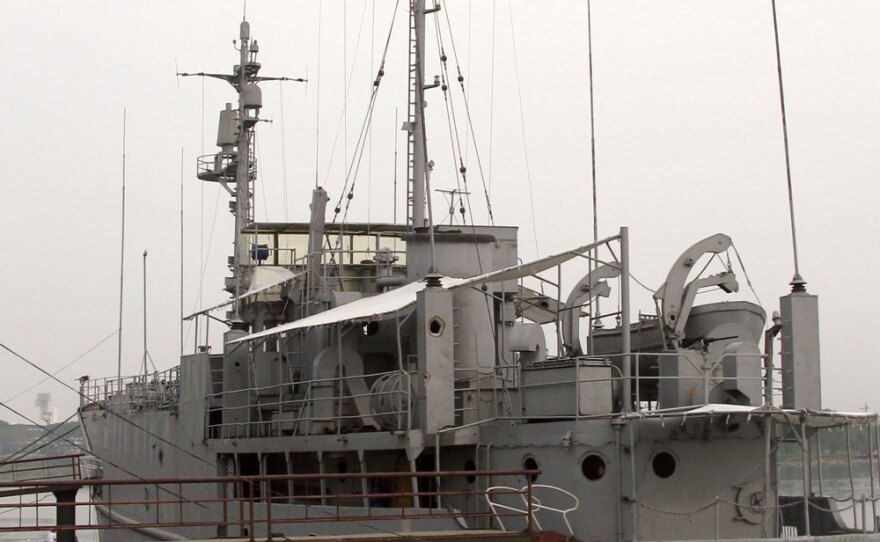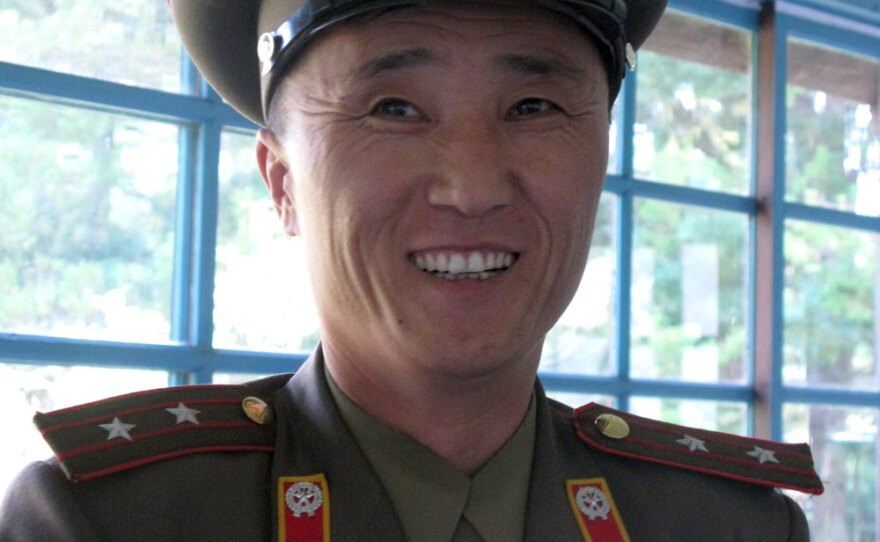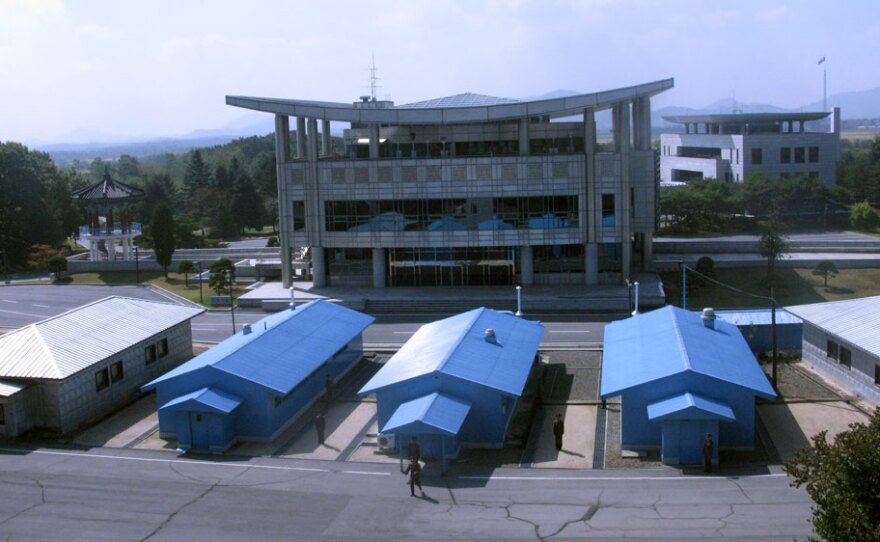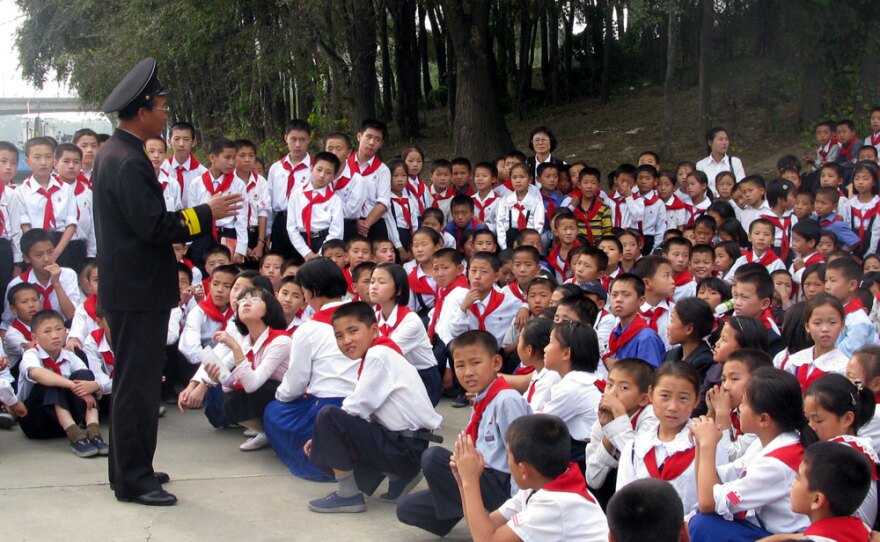NPR's Louisa Lim recently returned from a rare five-day visit to North Korea, where her movements were strictly controlled and monitored.

Earlier this week, North Korea test-fired five short-range missiles in what analysts believe is an attempt to improve its bargaining position ahead of possible bilateral talks with the U.S. Just last month, CIA Director Leon Panetta characterized Pyongyang and Washington as being in a "honeymoon situation."
But the chasm between North Korea and the U.S. sometimes seems insurmountable, especially on questions of history — and the way it's portrayed in North Korea's propaganda.
In the United States, the Korean War — fought between 1950 and 1953 — is known as the Forgotten War. But in Pyongyang, it's known as the Victorious Fatherland Liberation War.
Those different names underscore the immense gulf between the two countries' different versions of history. Nowhere was this most obvious than at the Victorious Fatherland Liberation War Museum, a cavernous gray building devoted to illustrating North Korea's version of the war.
'Kindergartner' Incapable Of Attacking 'Adult'
"The whole world unanimously denounces the United States as the starter of the Korean War," thundered a propaganda video, accompanied by music seemingly from a horror film.
This is what all North Koreans have been taught, including our tour guide, who gave her name as Mrs. Lee and whose high heels clacked as she took a tour group peremptorily around a basement collection of the spoils of war.
Flicking her long wooden pointer at the twisted wreckage of shot-down U.S. fighter planes, she explained the logic behind her thinking on the origins of the war.
"Our country was just a kindergartner, founded in 1948, a small country," she said. "But the U.S. [is a] big country, founded many years ago, and is an adult. Have you ever seen a small kid trying to touch and knock down a big man?"
She repeatedly asserted that North Korea won the Korean War, even though it ended in an armistice, which means North and South Korea are technically still at war. And Mrs. Lee did not hesitate in answering when asked whether there was any danger of another war between North Korea and the U.S.
"Of course! The U.S. is still preparing war in southern part of Korea, mobilizing and stockpiling nuclear bombs and weapons, and is pursuing hostile policy against our country, making moves to isolate and stifle our country. That is the danger," she said.
Threat Of 'Nuclear Annihilation'
North Korean propaganda emphasizes the sense of imminent threat from the U.S., perhaps to maximize internal unity in the face of hardships caused by long-term sanctions. One propaganda video, "The Answer of Korea," shot last year in response to the nuclear crisis, even makes reference to "the U.S. nuclear war plot aimed at annihilating the entire Korean nation."
It's against this backdrop that North Koreans describe their nuclear weapons as a "deterrent." That was the word used by our guide, Lt. Chae, on a tour of the demilitarized zone, or DMZ, dividing North and South Korea, possibly the most militarized place on Earth.
He said North Korea needed its nuclear weapons to defend peace on the Korean peninsula. Pyongyang would give them up, Chae continued, but only on one condition.
"Only if the U.S. gets rid of its nuclear weapons on the Korean peninsula and in their own territory, then we'll get rid of our nuclear weapons," he said.
Since 2006, American military commanders in South Korea have publicly said the U.S. does not maintain nuclear weapons on the Korean peninsula, even though the official policy is neither to confirm nor deny the presence of nuclear materials in Korea.

'Didn't You See The Video?'
The biggest propaganda trophy for the North Koreans is the USS Pueblo, an American spy ship captured by North Korea while on an intelligence-gathering mission in 1968. The North claimed the ship was inside its coastal zone, but the U.S. Navy said it was in international waters.
Pocked with bullet holes circled in red paint and moored on the Taedong River in Pyongyang, the USS Pueblo is now the only active-duty ship in enemy hands. Propaganda videos run inside the ship are watched by an endless stream of tourists. North Korean soldiers and schoolchildren tramp across the ship's decks, peering at a signed confession by the sailors and a framed U.S. apology mounted on a wall. It isn't mentioned that the apology was verbally retracted after the crewmen were released.
On the wharf alongside the gray boat is a crowd of schoolchildren wearing pristine white shirts and red Young Pioneer neck scarves, listening intently to an elderly man in uniform. He is one of the original sailors who captured the Pueblo and now works as a guide. Schoolchildren were present at many sites we visited, ensuring North Korea's version of history is firmly inculcated in its young.
Again, the video's version of events is unrecognizable. When the ship was taken, 83 American sailors were taken captive; one was killed, the others were held and tortured for 11 months. Last year, a federal judge in the U.S. awarded four of the sailors $65 million in damages after they filed suit against North Korea for their suffering. U.S. District Judge Henry H. Kennedy Jr. found their treatment to be "extensive and shocking."
The video, however, only mentions a letter written by the crew that says that their treatment was better than expected. It doesn't mention that the letter was written under duress. When I ask guide Lim Byong Suk why the men were mistreated, she denies it outright.
"No, no they were not beaten. Didn't you see the video? They wrote a letter to the American government, saying all their daily necessities were provided," she said.
Small Signs Of Changing Attitudes

For those few American tourists — about 300 so far this year — who visit the Hermit Kingdom, the experience can be discombobulating. The Americans are segregated from other tourists, even at mealtimes, and often feel they are given a hard sell on the evils of American imperialism.
Scott Nguyen from California said the message was clear.
" 'You evil capitalist swine pig. You screwed us over, and you're continuing to screw us over. If I had the opportunity, I'd punch you right now.' That's really the feeling that I got," he said, adding that even after leaving North Korea, he was still feeling the effects of the relentless barrage of propaganda.
"In some sense, I have to retrain myself to call it United States of America, and not Imperialist America, because that's all we heard," he said.
But Frank Cruise from Detroit, who was in the same tour group, said he hadn't felt any personal animosity against him.
"Maybe some people were more suspicious than others, but I liked the people very much," he said.
North Korean propaganda routinely refers to the Bush administration as "bellicose," "brigandish" and "like a thief." So it was notable that all our guides were studiously noncommittal about President Obama — "wait and see" was the stock reply, although one guide showed an impressive awareness of current affairs by asking about Obama's speech in April in Prague on nuclear disarmament.
It might be reading too much into it to say this restraint speaks of hope and expectation. But at the very least, the absence of aggressive rhetoric must be a step forward.
Copyright 2022 NPR. To see more, visit https://www.npr.org. 9(MDAzMjM2NDYzMDEyMzc1Njk5NjAxNzY3OQ001))







